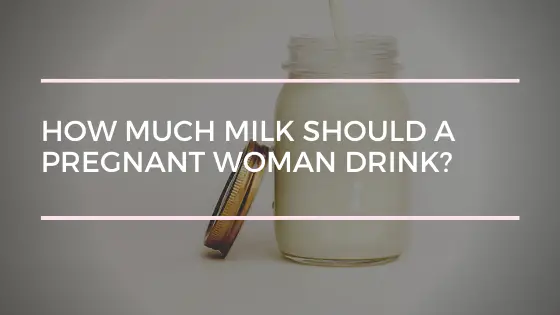Affiliate Disclosure – This post may contain affiliate links where we may receive compensation if you purchase products linked below. As an Amazon Associate, I can earn from qualifying purchases. This doesn’t cost you anything and helps keep our little blog running. Read our privacy policy for further information.
We’re big advocates of drinking milk during pregnancy due to some of the great health benefits it provides a pregnant mother. We discuss the benefits of milk later in the post but in short, milk is great for helping the development of your babies fetal skeleton all the way to helping with strengthening their nervous system and brain development.
Why is Milk (Calcium) Important During Pregnancy
Milk provides some great health benefits for any expecting mother. This includes:
- Healthy amounts of calcium – Calcium is used to support the development of the fetal skeleton while in the womb. It’s thought that an expecting mum can provide up to 330 mg of calcium to their baby. For this reason, it’s recommended that a pregnant woman should have a minimum of 1,300 mg of calcium per day to help ensure they are getting enough for themself while also getting enough for their little one.
- Increased levels of vitamin D – Milk is a fantastic source of vitamin D which studies have found can lower a babies chance of developing allergies.
- Increased levels of protein, amino acids and fatty acids – Milk is rich in protein, amino acids and fatty acids which are essential for the development of a babies nervous system. While according to studies it’s also thought that the protein from milk can also aid with the growth of the foetus which helps with your baby having a healthy birth weight. This is particularly important as low birth weights are linked with increased risks of neonatal deaths and increased diabetes in adulthood.
- Keeps you hydrated – Milk is a great way of keeping you hydrated which is especially important when you’re pregnant due to the amount of fluid loss that occurs during the pregnancy.
- Brain development – It’s thought that the iodine content in milk can enhance foetal brain development which is linked with having a greater IQ.
It’s pretty clear based on the above that milk provides a lot of health benefits for any expecting mother and their baby. If you haven’t been a massive milk drinker in the past, it’s never too late to start and reap the benefits! You never know, it might be something that you end up still enjoying with a coffee once your baby arrives to help you through those sleepless nights. We’ve also written about how much coffee you should drink while breast feeding which might be of interest!
Why You Shouldn’t Drink Too Much Milk During Pregnancy?
While drinking milk comes with benefits which we’ve just discussed, it’s also something that you should drink in moderation to avoid any negative side effects. Studies undertaken have found that too much milk can result in iron deficiency due to too much milk upsetting the lining of their stomach. This in turn results in iron levels reducing to try help the upset stomach.
What Type of Milk is Best to Drink During Pregnancy?
Milk comes in many different forms whether it be being extracted from animals like cows to being extracted from nuts like almonds! We share some general advice about the different types of milk out there below:
- Cows Milk – The most common type of milk readily accessible in supermarket stores. This type of milk is rich in calcium, vitamin D and protein. Generally a glass of cow’s milk will provide you with 285 mg of calcium.
- Goats Milk – Not as readily accessible as cows milk and we’d be surprised if people out there are drinking it. Nevertheless though, goats milk is a great source for calcium, vitamin B2 and protein. Generally a glass of goats milk will provide 283 mg of calcium.
- Almond Milk – Made using almonds, almond milk is rich in vitamin B, folic acid, protein and iron. Unfortunately almond milk doesn’t provide a great deal of calcium compared to other milks as it only holds 7.5 mg of calcium per glass.
- Oat Milk – Made using oats, oat milk is high in fibre, Vitamins A and B while also being high in protein. Similar to almond milk, oat milk isn’t high in calcium compared to other milks. Generally oat milk contains 120 mg of calcium per glass.
- Soy Milk – Made using soy beans, soy milk is a great source for calcium and antioxidants. Generally soy milk will provide 300 mg of calcium.
- Coconut milk – Made using coconuts, coconut milk is strong in calcium as well as lauric and capric acid. Coconut milk is super high in calcium compared to some of the other milks listed here. Generally a cup of calcium milk will have 459 mg of calcium.
In terms of what milk is best to drink during pregnancy ultimately depends on your personal preference which may be influenced by whether you’re dairy intolerant. If you are drinking animal based milk drinks, we recommend avoiding unpasteurized milk. This is due to unpasteurized milk being raw milk which may include bacteria from the cow which may cause unknown issues to your baby.
How Much Milk Should a Pregnant Woman During a Day?
As mentioned previously in the article, it’s recommended that a pregnant woman drinks around 1,300 mg of calcium a day. Based on some of the different types of milks listed above, this roughly equates to:
- 4.5 glasses of cows milk
- 4.5 glasses of goats milk
- 173 glasses of almond milk
- 11 glasses of oat milk
- 4.5 glasses of soy milk
- 3 glasses of coconut milk
Don’t forget that you can also get calcium through other sources too. We think it’s probably unrealistic for some people to get all their source from milk and instead we recommend opting for a more balanced diet where you’re not limiting your calcium from one source. Some other great sources of calcium for pregnant mothers include:
- Yoghurt which has 415 mg of calcium in a 8 oz (225 g) per serving
- Sardines has 325 mg of calcium in a regular serving
- Cheddar cheese has 307 mg of calcium in 1.5 oz (42 g) per serving
- Salmon has 181 mg of calcium in 3 oz (85 g) per serving
- Kale has 94 mg of calcium per 1 cup serving
- Bok choy has 74 mg of calcium per 1 cup serving
Closing / Summary
It’s pretty clear that drinking milk during pregnancy is a great source of calcium, vitamin D, protein and helps build on your amino acids. While we think you may struggle to get your recommended 1300 mg of calcium through drinking almond milk (173 glasses!), we’d recommend opting for a more balanced diet where you’re sourcing your calcium (and also protein, etc) through a range of foods whether it be yoghurt, milk, salmon and bok choy.
We hope this article has been helpful for you in understanding how much milk you should drink during pregnancy.
Thanks for reading!
Affiliate Disclosure – This post may contain affiliate links where we may receive compensation if you purchase products linked below. As an Amazon Associate, I can earn from qualifying purchases. This doesn’t cost you anything and helps keep our little blog running. Read our privacy policy for further information.

My name’s Alex and I’m a husband, dad to beautiful identical twin boys, cyclist, photographer and connoisseur of great coffee!
Help I’m Having Twins has been created for me to share what I found useful as a new parent and dad to twins.



